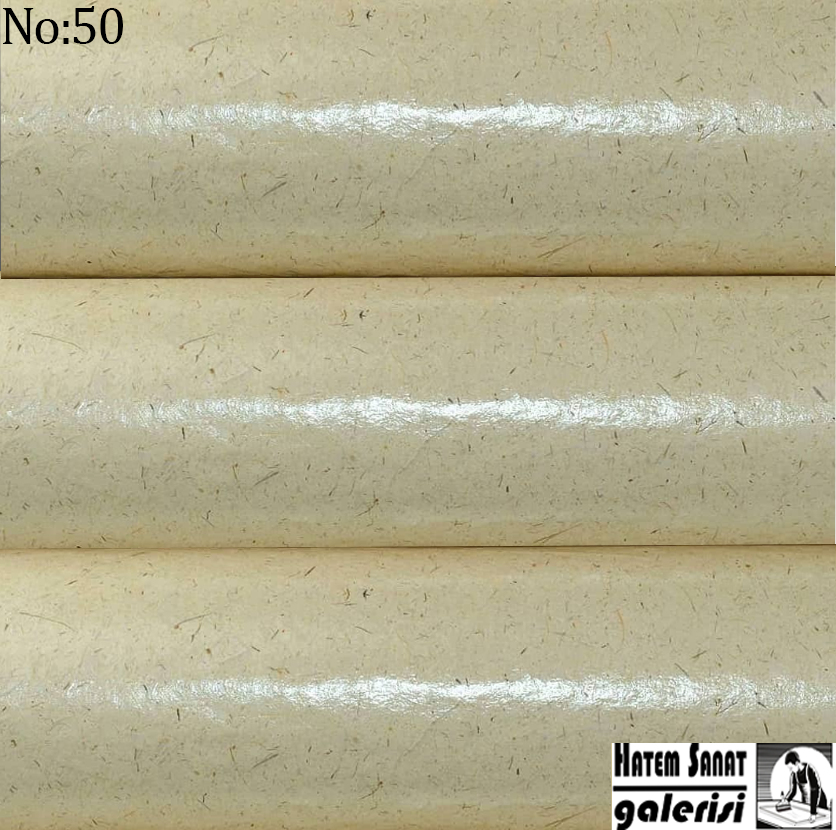
AHARLI KAĞIT VE HAT MALZEMELERİ İÇİNDEKİ ÖNEMİ
Aharlı Kağıt kelime olarak, arapçada ورق مقهر ingilizce karşılık
olarak da Ahar Paper şeklinde bilinmektedir. Yumurta yardımı ile kağıdı güçlendirmek ve hattatların
kağıda rahat bir şekilde yazmaları için yüz yıllardır uygulananmaktadır. Aharlı
kağıt yapımı günümüzde son halini almış ve profesyonel olarak
icra edilen bir meslektir.
AHARLI KAĞIT NASIL BEKLETİLİR?
Nişasta rutubetten çok etkilenen bir maddedir
kağıtlar bekletilirken asla naylon torbaya konmamalıdır. Bekletmek için yeterli
yer mevcutsa üst üste konur ve üstüne ağırlık bırakılır. Yada ahar dışta
kalacak şekilde rulo yapılarak bekletilir. Aharlı kağıt , hat
malzemeleri içinde başta gelen malzemelerdendir.
Aharlı Kağıt kullanıcısı tarafından önceden alınıp bekletilerek kullanılması
gereken bir malzemedir. Yapım tarihinden acil yazılarda en az 1-2 hafta,
keyfi durumlarda 3 ay bekletilmesi yeterli olacaktır. Kış
aylarında aharlanan ve yaz aylarında aharlanan kağıtlar
arasında farklar vardır. Kış aylarında Aharlı kağıt üzerine daha
rahat yazmak için; taze (az beklemiş) kağıtlara yazmadan önce kağıdı aharı ön
tarafında kalacak şekilde rulo yaparak bir kalorifer peteği üzerinde birkaç
saat bekletmek bile 10 kat daha rahat yazmaya ve kalemin aharlı kağıt üzerinde
rahat ilerlemesini sağlayacaktır. Yaz aylarında kağıdın kuruma süresi daha
hızlı olacaktır. ‘Kağıdı 2-3 sene bekletmeden yazılmaz’’ şeklinde süregelen
bilgi tevatür ve efsaneden ibarettir. Zaman sanatkar için en kıymetli
hazinedir. Tabii ki kağıtlar keyfi durumlarda ne kadar uzun süre bekletilirse
hattat için daha faydalı olacaktır. Yanlış teknikler ile hazırlanmış kağıt
kıyamete kadarda beklese yine de hattata fayda vermez .
AHARLI KAĞITLARA TASHİH MESELESİ
Doğru teknikler ile hazırlanmış ve beklememiş aharlı
kağıtta yazı esnasında bir hata durumumda hattat mürekkebi su ile silerse
mürekkebin kağıttan altında mürekkep izi kalmadan ‘’yumurta
ile beraber‘’ sıyrıldığını görecektir. Beklemiş kağıtlarda ise
mürekkep yumurta ile sıyrılmaz yumurta kağıtta kalır mürekkep ise temizlendiği
pamuk yada temizlendiği malzeme üzerinde kalır. Harfi kazıma yöntemi ile
tashih yapılırsa beklemiş yada beklememiş kağıt ayrımı yapılmaksızın eğer ahar
kaliteli ise mürekkep kağıt üzerinden sıyrılacaktır. Tabii ki beklemiş
kağıtlarda mürekkebi kazırken daha sert ve tok bir zeminden kazınacağı için
kağıtta gözükecek kazıma izi ve hasarda daha az olacaktır.
DOĞRU KAĞIT NASIL SEÇİLİR
Aharlı kağıt seçerken dikkat edilecek bazı hususlar
vardır. İs mürekkebi ile Shiminckhe mürekkebi gibi
yada Japon mürekkepleri ile üzerine yazarken özellikle kalemin aynı harfin
üzerinden 2 defe geçtiği durumlarda ( Sülüs Yazı ''LAM'' harfi) gibi
mürekkebin ahar üzerinde çamurlaşması ,mürekkebin ahar üzerinde pudra
sürüldükten sonra bile tutmaması kağıdın aşırı parlak ve pürüzsüz gözükmesi
yanlış kağıdın seçildiğini gösterir ve aharlı kağıdın yanlış teknikler ile
yapıldığının yada kimyasal bazı maddelere
başvurulduğunun işaretleri olabilir. Bu gibi durumlarda kağıtlarda
silinme ve kazınma gibi özellikler aranmaz. Zaten kalem de kağıt üzerinde
rahat ilerlemez. Yazıyı bu tarz kâğıtlara yazmak eserin zayi olmasına eserin
kalitesinin düşmesine ve harflerin güzelliğinin gözükmesine mani
olacaktır Kağıdın cinsinin İtalyan bambu yada el yapımı olması kağıdın
kalitesini belirlemez. Kağıdın kalitesi ancak, üzerindeki ahar işçiliği ile
belirlenir.
Kağıdın ahardan önce bir mukavva üzerine
gerdirilerek sabitlemek gerekir. Bu gerdirme işlemi fazla yapılırsa 2.
katlardan sonra kağıt ortasından patlayarak yırtılır. Az gerdirilirse aharlı kağıt kendini salar yumurta ve nişastayı sürmek zorlaşır. İnce
kağıtlarda ise bu durum daha zorlaşır
AHARLI KAĞIT YAPIMI
Aharlı kağıt yapımı fazlaca teknik bir iştir. Binlerce
kağıt yapmadan doğru kıvama ve tekniğe ulaşmak mümkün değildir. Her kağıt
çeşidinin kendine özgü yumurta ve nişasta kıvamı vardır. Aynı cins kağıtlarda
bile farklı renklerde yumurta ve nişasta kıvamları farklılık göstermektedir.
Yumurta ve nişastayı kağıda uygularken kağıt üzerinde iz bırakmadan sürmek
fazlaca tecrübe gerektirir. Bu iz bırakmadan sürme tekniği her kağıt çeşidi
için farklılık arz eder. Kağıtların üzerine yumurta ve nişastayı kat kat sürmek
kağıdın çatlamasına yol açar. 1. Katı sürdükten sonra 2. Kata geçmek için
yeterli miktarda beklemek gerekir.
Ham yumurta akının uygulamaya hazırlanışı başlı
başına bir iştir. Doğru kıvama ulaşmak için fazlaca koli yumurta ile deneme
yapmak ve etkilerini tecrübe etmek gerekmektedir. Şapın yumurtaya az karışması
yumurtanın balçık olmasına fazla karışması ise yumurtanın kristalize olmasına
sebep olur ve yumurta kendi içinde çatlar. Pişmiş nişastanın ise fazla yoğun
olması yumurtanın kalemi tutmasına az yoğun olması ise yumurtanın etkısını
kıracaktır.
KAĞITLARIN MÜHRELENMESİ
Kağıtların
mührelenmesi ise fazlaca yorucudur. Akik taşı ile kağıdın kaymayacağı bir zemin
üzerinde taşı kağıda el yordamı ile bastırarak ileri geri pres yapmayı
gerektirir. Böylece kağıt yumurta ile kaynaşarak yazım kalitesini artıracaktır.
Ve kağıt nişasta ve yumurtanın verdiği sertlikten kurtulur eski hamur
kıvamına ulaşarak rahatlayacaktır. Ahar ustasının mühre taşını kağıdın her
noktasına değdirmesi mümkün değidir. Bu sebeple her hattat bir kağıt mühresi
edinerek yazı için kestiği kağıt parçasını arkasından (aharsız yerinden )
mührelemelidir. Mühre asla aharlı kısma sürülmez taş aharı çizecektir. Akik
mühre sadece altını parlatır. Ahar üzerinde bir etki bırakmaz. Aharlı
kağıda Cam yada akik ile mühre yapmak arasında hiçbir fark
yoktur.
AHAR ÜZERİNE NASIL YAZILIR
Aharlı kağıt üzerine yazı yazmak diğer kuşe yada taş kağıtları üzerine yazı yazmaktan çok farklıdır. Hattatlar karalamalarını yaparken aharlı kağıt üzerine yazarak kendilerini hazırlar talebeler ise belli bir aşamaya kadar kuşe kağıtlar ile çalıştıktan sonra mutlaka derslerini aharlı kağıda yazarak kendilerini hazırlamalı ve alıştırmalıdır. Hatem Sanat Galerisi en kaliteli aharlı kağıtları İstanbul da ki atölyesinde üreterek bu sanata ilgi duyan amatör ve profesyonel tüm sanat severlere hizmet vermektedir. Tüm aharlı kağıt çeşitleri için www.hatemart.com ziyaret edebilrsiniz
E-posta adresiniz yayınlanmaz. Zorunlu alanlar işaretlidir.*



Henüz yorum yapılmamış